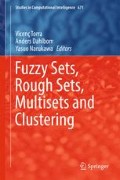Abstract
An initial assessment on a given set of alternatives is necessary for understanding complex decision problems and their possible solutions. Attitudes and preferences articulate and come together under a decision process that should be explicitly modeled for understanding and solving the inherent conflict of decision making. This paper revises multi-criteria modeling of imprecise data, inferring outranking and indifference binary relations and classifying alternatives according to their similarity or dependency. After the initial assessment on the set of alternatives, preference orders are built according to the attitudes of decision makers, aiding the decision process by identifying solutions with minimal dissention.
Access this chapter
Tax calculation will be finalised at checkout
Purchases are for personal use only
References
Bustince H, Barrenechea E, Pagola M, Fernandez J.: The notions of overlap and grouping functions. Studies in Fuzziness and Soft Computing 336,137-156 (2016)
Bustince H, Montero J, Pagola M, Barrenechea E, Gómez D.: A survey of interval-valued fuzzy sets. In: Pedrycz W, Skowron A, Kreinovich V (eds.), Handbook of Granular Computing, Chichester: John Wiley & Sons; 2008, p. 491-515.
Fernández JM, Murakami S.: Extending Yager’s orness concept for the OWA aggregators to other mean operators. Fuzzy Sets and Systems 139, 515-542 (2003)
Fodor J, Roubens M.: Fuzzy Preference Modelling and Multicriteria Decision Support. Kluwer Academic Publishers, Dordrecht (1994)
Franco C, Hougaard JL, Nielsen K.: A fuzzy approach to the Weighted Overlap Dominance Model. Proceedings of the 15th Conference of the Spanish Association for Artificial Intelligence, Madrid, Spain, September 17-20, 2013, p. 1240-1249.
Franco C, Hougaard JL, Nielsen K.: Ranking alternatives based on imprecise multi-criteria data and pairwise overlap dominance relations. MSAP Working Papers Series (2014)
Franco C, Hougaard JL, Nielsen K.: Handling risk attitudes for preference learning and intelligent decision support. Lecture Notes in Computer Science 9321, 78-89 (2015)
Grabisch M, Labreuche Ch.: A decade of application of the Choquet and Sugeno integrals in multi-criteria decision aid. Annals of Operations Research 175, 247-290 (2010)
Grattan-Guinness I.: Fuzzy membership mapped onto interval and many-valued quantities. Mathematical Logic Quarterly 22, 149-60 (1976)
Hougaard JL, Nielsen K.: Weighted Overlap Dominance - A procedure for interactive selection on multidimensional interval data. Applied Mathematical Modelling 35, 3958-3969 (2011)
Y. Narukawa, V. Torra. Fuzzy measures and Choquet integral on discrete spaces. In: B. Reusch (ed.), Computational Intelligence, Theory and Applications, Berlin: Springer; 2004, p. 573-581.
Roy B.: The outranking approach and the foundation of ELECTRE methods. Theory and Decision 31, 49-73 (1991)
Acknowledgements
This research has been partially supported by the Danish Industry Foundation and the Center for research in the Foundations of Electronic Markets (CFEM), funded by the Danish Council for Strategic Research.
Author information
Authors and Affiliations
Corresponding author
Editor information
Editors and Affiliations
Rights and permissions
Copyright information
© 2017 Springer International Publishing AG
About this chapter
Cite this chapter
Franco, C., Hougaard, J.L., Nielsen, K. (2017). Clustering Alternatives and Learning Preferences Based on Decision Attitudes and Weighted Overlap Dominance. In: Torra, V., Dahlbom, A., Narukawa, Y. (eds) Fuzzy Sets, Rough Sets, Multisets and Clustering. Studies in Computational Intelligence, vol 671. Springer, Cham. https://doi.org/10.1007/978-3-319-47557-8_20
Download citation
DOI: https://doi.org/10.1007/978-3-319-47557-8_20
Published:
Publisher Name: Springer, Cham
Print ISBN: 978-3-319-47556-1
Online ISBN: 978-3-319-47557-8
eBook Packages: EngineeringEngineering (R0)

